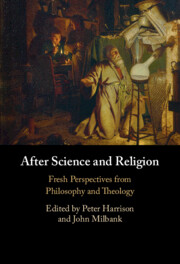Book contents
- After Science and Religion
- Reviews
- After Science and Religion
- Copyright page
- Contents
- Contributors
- Acknowledgements
- Introduction
- Part I Modern Historians on ‘Science’ and ‘Religion’
- Part II Beyond ‘Science and Religion’
- Part III Philosophical Problems with ‘Science’ and ‘Religion’
- Part IV Before Science and Religion
- Chapter 11 Lessons in the Distant Mirror of Medieval Physics
- Chapter 12 Physics as Spiritual Exercise
- Chapter 13 Making Art
- Conclusion
- References
- Index
Chapter 13 - Making Art
Meaningful Materials and Methods
from Part IV - Before Science and Religion
Published online by Cambridge University Press: 05 May 2022
- After Science and Religion
- Reviews
- After Science and Religion
- Copyright page
- Contents
- Contributors
- Acknowledgements
- Introduction
- Part I Modern Historians on ‘Science’ and ‘Religion’
- Part II Beyond ‘Science and Religion’
- Part III Philosophical Problems with ‘Science’ and ‘Religion’
- Part IV Before Science and Religion
- Chapter 11 Lessons in the Distant Mirror of Medieval Physics
- Chapter 12 Physics as Spiritual Exercise
- Chapter 13 Making Art
- Conclusion
- References
- Index
Summary
Can physics be beneficial for bringing about human moral and spiritual goods? Modern physics is perpetually in search for grand unification of our world-pictures, but its method is arbitrarily self-limiting in ruling out any place in its conception of nature for the human as spiritual and moral beings. But this estrangement between nature and the human has not always been the case. Drawing from Pierre Hadot’s pioneering work, this essay retrieves the notion of physics as ‘spiritual exercise’ from ancient philosophy and early Christianity for reimagining the enterprise of physics today. Envisaged as spiritual exercise, ancient physics goes beyond a mere acquisition of ‘objective’ knowledge of nature towards the fashioning of human moral and spiritual transformation. Illustrating from Origen of Alexandria, I show that this vision of physics is principally grounded upon a metaphysics that unites all parts of nature, including human nature, into a single whole. This chapter argues that it is desirable to retrieve the ancient vision today not as a displacement of modern physics but through the re-invention of natural philosophy alongside it. This retrieval should give urgency to the task of rethinking the desirability of a comprehensive and unified metaphysical account of nature for today.
- Type
- Chapter
- Information
- After Science and ReligionFresh Perspectives from Philosophy and Theology, pp. 299 - 315Publisher: Cambridge University PressPrint publication year: 2022



